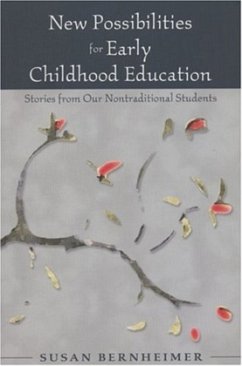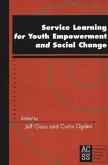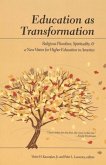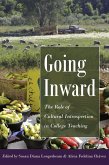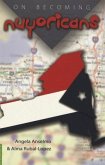This book speaks to the heart of an urgent task facing teacher preparation programs on campuses at the beginning of the twenty-first century: How can college instructors work most effectively with a new generation of nontraditional students that includes growing numbers of immigrants, single parents, and returning homemakers struggling to find their way in large and unfamiliar institutions? Susan Bernheimer went straight to the source for answers, interviewing impoverished students aspiring to become teachers of young children. Revealing, poignant, and replete with practical insights about learning and inclusion, the students' words reflect their desire to become teachers - a desire hidden beneath their fears and silence. Their stories, testaments to courage and faith, remind us of the pivotal role of the classroom teacher at all levels of education. In a book filled with student narratives, classroom vignettes, and instructional strategies, Bernheimer shows rather than tells, inspires rather than judges. She blends research and interviews with her own classroom experience and urges educators to integrate students' lives and voices into the curriculum. New Possibilities for Early Childhood Education offers an inside perspective and a new vision for all classroom teachers.
«Susan Bernheimer's stories from nontraditional college students remind us of the power of the human spirit - and the power of storytelling in human learning. Adult education that builds on learners' own life experiences can help all class members understand human development theory, not just as textbook knowledge but as it illuminates the diversity of the real lives of adults and children.» (Elizabeth Jones, Faculty, Human Development, Pacific Oaks College, Pasadena, California; Author, 'Teaching Adults: An Active Learning Process')
«This book will find an important place in the efforts to improve higher education for nontraditional students. Bernheimer knows how to grab the reader. My heart pounded as I stood on her battleground as she prepared to teach early childhood education to people whose backgrounds differed so vastly from hers. This book is about truths - painful truths - multiple truths!» (Janet Gonzalez-Mena, Author, 'Multicultural Issues in Child Care')
«Susan Bernheimer offers teacher educators an important call to action with this significant book. Not only are the students' stories compelling, but the idea of using these stories to reshape our emphasis is something we must take very seriously. In the tradition of Myles Horton and Paulo Freire, Bernheimer reminds us that teachers are students and students are teachers. Even though I have taught early childhood students for over twenty years, this book gave me a new perspective and a challenge I plan to undertake. I encourage all who care about cultivating new leadership and expanding the voices and perspectives in the early childhood field to make this book a focus of serious consideration.» (Margie Carter, Adjunct Faculty, Pacific Oaks College and Shoreline Community College, Seattle, Washington; Author, 'Training Teachers: A Harvest of Theory and Practice')
«In 'New Possibilities for Early Childhood Education', Susan Bernheimer shares a creative, insightful way to present early childhood education to a class of nontraditional students from impoverished backgrounds. She successfully blends student interviews and vignettes into the more standard instructional material and involves students in active participation. Bernheimer challenges us to revisit our teaching practices and invites us to test the use of the life stories of our students to enrich our curriculum.» (Docia Zavitkovsky, Past Present, National Association for the Education of Young Children; Author, 'Listen to the Children')
«Classrooms are sites of struggle where narratives collide and subjectivities are made and re-made in the image of both the limitations and possibilities for transformation. Susan Bernheimer's book visits the charged arena of the college classroom where she encounters the moving testimonials of nontraditional students. She engages their stories and their lives with sensitivity and insight. This important new book documents a journey of hope and a pedagogy of possibility.» (Peter McLaren, Professor of Education, Graduate School of Education and Information Studies, U.C.L.A.; Author, 'Che Guevara, Paulo Freire, and the Pedagogy of Revolution')
«Many childcare providers in the United States are poor women whose own childhoods were often cut short by the demands of poverty and other hardships. Those that enroll in college-level early childhood preparation programs hear the formulas for 'normal' development and the preferred child rearing patterns of middle-class, white America, a culture far removed from their own experience. Susan Bernheimer and her participants treat this dilemma in a most compelling manner. Their stories add significant insights into childhood and
«This book will find an important place in the efforts to improve higher education for nontraditional students. Bernheimer knows how to grab the reader. My heart pounded as I stood on her battleground as she prepared to teach early childhood education to people whose backgrounds differed so vastly from hers. This book is about truths - painful truths - multiple truths!» (Janet Gonzalez-Mena, Author, 'Multicultural Issues in Child Care')
«Susan Bernheimer offers teacher educators an important call to action with this significant book. Not only are the students' stories compelling, but the idea of using these stories to reshape our emphasis is something we must take very seriously. In the tradition of Myles Horton and Paulo Freire, Bernheimer reminds us that teachers are students and students are teachers. Even though I have taught early childhood students for over twenty years, this book gave me a new perspective and a challenge I plan to undertake. I encourage all who care about cultivating new leadership and expanding the voices and perspectives in the early childhood field to make this book a focus of serious consideration.» (Margie Carter, Adjunct Faculty, Pacific Oaks College and Shoreline Community College, Seattle, Washington; Author, 'Training Teachers: A Harvest of Theory and Practice')
«In 'New Possibilities for Early Childhood Education', Susan Bernheimer shares a creative, insightful way to present early childhood education to a class of nontraditional students from impoverished backgrounds. She successfully blends student interviews and vignettes into the more standard instructional material and involves students in active participation. Bernheimer challenges us to revisit our teaching practices and invites us to test the use of the life stories of our students to enrich our curriculum.» (Docia Zavitkovsky, Past Present, National Association for the Education of Young Children; Author, 'Listen to the Children')
«Classrooms are sites of struggle where narratives collide and subjectivities are made and re-made in the image of both the limitations and possibilities for transformation. Susan Bernheimer's book visits the charged arena of the college classroom where she encounters the moving testimonials of nontraditional students. She engages their stories and their lives with sensitivity and insight. This important new book documents a journey of hope and a pedagogy of possibility.» (Peter McLaren, Professor of Education, Graduate School of Education and Information Studies, U.C.L.A.; Author, 'Che Guevara, Paulo Freire, and the Pedagogy of Revolution')
«Many childcare providers in the United States are poor women whose own childhoods were often cut short by the demands of poverty and other hardships. Those that enroll in college-level early childhood preparation programs hear the formulas for 'normal' development and the preferred child rearing patterns of middle-class, white America, a culture far removed from their own experience. Susan Bernheimer and her participants treat this dilemma in a most compelling manner. Their stories add significant insights into childhood and

